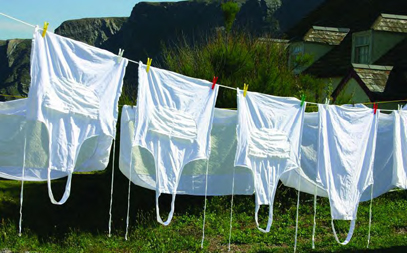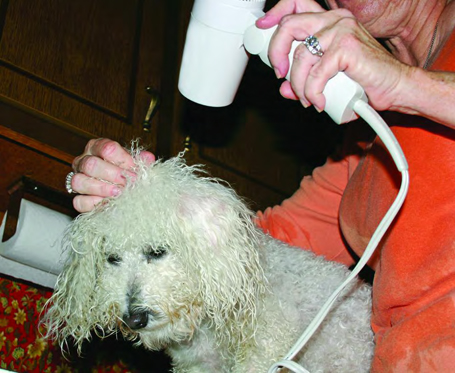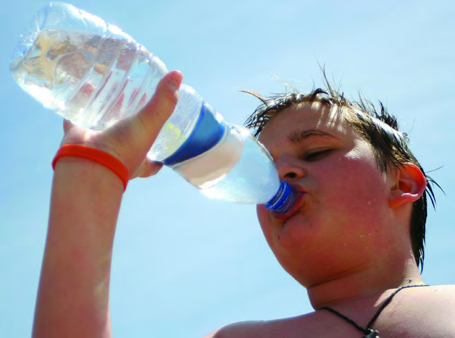Evaporation
How Can You Speed Up Evaporation?, How Does Evaporation Keep You Cool?
How Can You Speed Up Evaporation?
Your clothes need to be washed when they get dirty. After they are washed, the water in them evaporates. When all the water has evaporated, the clothes are dry.
You can help wet clothes dry quickly by spreading them out on a clothesline. Water evaporates faster when it is warmer. So the clothes will dry faster on a warm day than on a cold day.
 These aprons would dry even faster if there was a breeze.
These aprons would dry even faster if there was a breeze.
 The dog will dry quickly because of the warm air from the hair dryer.
The dog will dry quickly because of the warm air from the hair dryer.
When water evaporates, the water vapor mixes with the air. Eventually the air has as much water vapor as it can hold. When this happens, no more water can evaporate from the clothes.
Wet clothes dry faster on a windy day. This is because the wind blows the water vapor away. Clothes dryers and hair dryers also speed up evaporation. They blow warm air. The warmth helps evaporate water from the clothes or hair. The moving air carries the water vapor away.
 You lose a lot of water as sweat in hot weather. You need to drink more water to replace it. You want to make sure your body has enough.
You lose a lot of water as sweat in hot weather. You need to drink more water to replace it. You want to make sure your body has enough.
How Does Evaporation Keep You Cool?
When you run around, your body gets warm. You may start to sweat. Sweat is your body's way of keeping cool. Sweat glands in your skin produce this salty liquid. As the sweat evaporates, it cools your skin. When some of a liquid evaporates, the liquid left behind is cooler than it was to start with.
Sweat works best on a breezy day. Liquids can evaporate faster when a breeze moves away the vapor that has already evaporated.
Humid air is air that already contains a lot of water vapor. This makes it harder for sweat to evaporate. Humid days feel uncomfortable because your sweat does not evaporate. You feel hot and sticky.
COOL DOGS!
 Dogs can sweat only through their feet, where there is no fur. Dogs keep cool by panting.
Dogs can sweat only through their feet, where there is no fur. Dogs keep cool by panting.
Additional topics
- Extreme Changes of State - Low Boiling Points
- Solids, Liquids, and Gases at Home - Melting Points, Boiling Points, Is Sugar a Solid or a Liquid?, Mixtures of States
- Other Free Encyclopedias